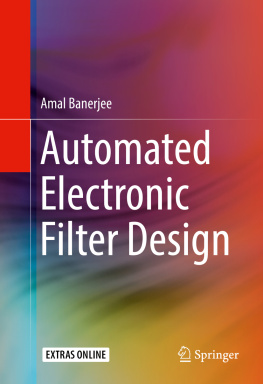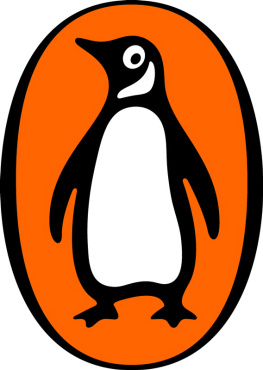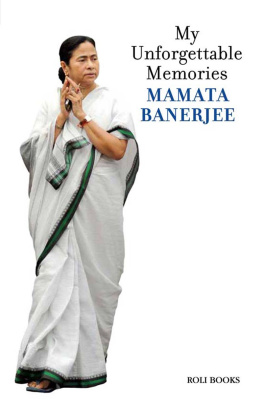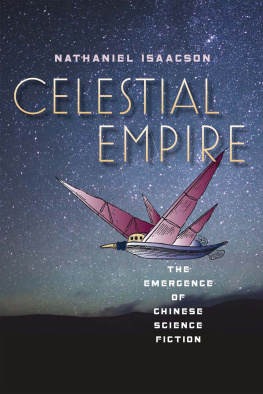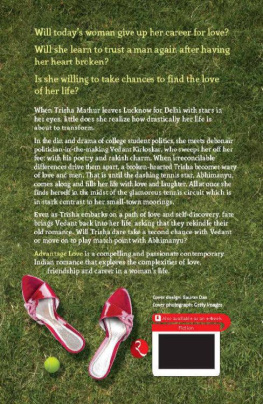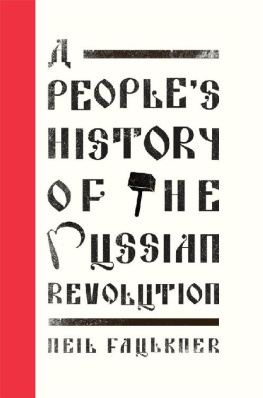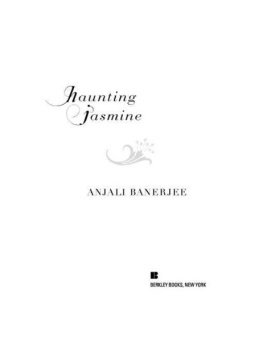Banerjee - We Modern People: Science Fiction and the Making of Russian Modernity
Here you can read online Banerjee - We Modern People: Science Fiction and the Making of Russian Modernity full text of the book (entire story) in english for free. Download pdf and epub, get meaning, cover and reviews about this ebook. year: 2012;2013, publisher: Wesleyan University Press, genre: Politics. Description of the work, (preface) as well as reviews are available. Best literature library LitArk.com created for fans of good reading and offers a wide selection of genres:
Romance novel
Science fiction
Adventure
Detective
Science
History
Home and family
Prose
Art
Politics
Computer
Non-fiction
Religion
Business
Children
Humor
Choose a favorite category and find really read worthwhile books. Enjoy immersion in the world of imagination, feel the emotions of the characters or learn something new for yourself, make an fascinating discovery.

We Modern People: Science Fiction and the Making of Russian Modernity: summary, description and annotation
We offer to read an annotation, description, summary or preface (depends on what the author of the book "We Modern People: Science Fiction and the Making of Russian Modernity" wrote himself). If you haven't found the necessary information about the book — write in the comments, we will try to find it.
We Modern People: Science Fiction and the Making of Russian Modernity — read online for free the complete book (whole text) full work
Below is the text of the book, divided by pages. System saving the place of the last page read, allows you to conveniently read the book "We Modern People: Science Fiction and the Making of Russian Modernity" online for free, without having to search again every time where you left off. Put a bookmark, and you can go to the page where you finished reading at any time.
Font size:
Interval:
Bookmark:
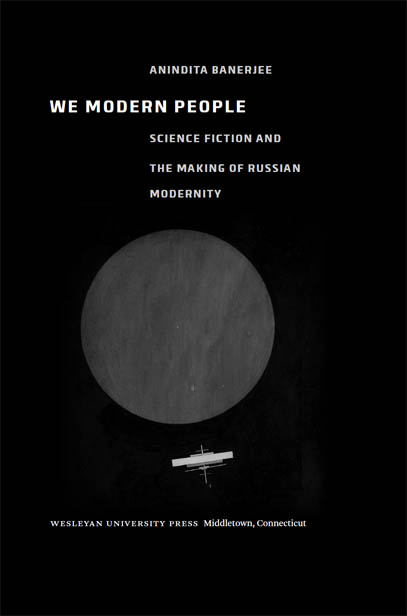
Wesleyan University Press
Middletown CT 06459
www.wesleyan.edu/wespress
2012 Anindita Banerjee
All rights reserved
Manufactured in the United States of America
Designed by Richard Hendel
Typeset in Arnhem and Clio by Tseng Information Systems, Inc.
Wesleyan University Press is a member of the Green Press Initiative. The paper used in this book meets their minimum requirement for recycled paper.
Wesleyan University Press is grateful to the Hull Memorial Fund of Cornell University for assistance with this publication.
Every reasonable attempt has been made to identify owners of copyright, and obtain their written permission. Errors or omissions will be corrected in subsequent editions. Please contact the publisher.
Library of Congress Cataloging-in-Publication Data
Banerjee, Anindita.
We modern people: science fiction and the making of Russian modernity /
Anindita Banerjee.
p. cm.
Includes bibliographical references and index.
ISBN 978-0-8195-7333-9 (cloth: alk. paper)ISBN 978-0-8195-7334-6 (pbk.: alk. paper)ISBN 978-0-8195-7335-3 (ebook)
1. Science fiction, RussianHistory and criticism. 2. Literature and societyRussia (Federation) 3. Russian fiction20th centuryHistory and criticism. 4. Russia (Federation)Civilization20th century. I. Title.
PG3098.S5B36 2012
891.7308762dc23 2012032037
5 4 3 2 1
This book is about the alternative worlds of science fiction, but writing it would not have been possible without the help of many real people. First and foremost, I owe an enormous debt of gratitude to the people who were involved in the very first stages of its inception and the very last stages of its completion. Although this book has morphed into something quite different than the dissertation I wrote at the University of California, Los Angeles, it still bears the imprint of my advisers, Ronald Vroon and N. Katherine Hayles, who always encouraged me to push beyond canonical texts and established ways of thinking. Michael Heim, Gail Lenhoff, and Alexander Ospovat were always ready to help as I worked my way through eccentric writers and rare materials. At the other end of the process, the final version of that initial idea would not have become a book without the active mentorship of Istvan Csicsery-Ronay and Arthur Evans. Under their editorship, a shorter version of the third chapter was published in Science Fiction Studies under the title Electricity: Science Fiction and Modernity in Early-Twentieth-Century Russia (Science Fiction Studies 30, 89 [2003]: 4971). I am profoundly indebted to Parker Smathers, my editor at Wesleyan University Press, whose very human presence carried the project through.
Along the way, there were almost too many people to thank here. Kenneth Calhoon, Katya Hokanson, Jenifer Presto, and Michael Stern, former colleagues at the University of Oregon, helped me brainstorm critical areas of the emerging manuscript. Jenifer Presto, in particular, has been instrumental in shaping both the title and the contents of the book, having suffered through many drafts and many versions of its different parts. At Cornell University, I have benefitted from the generosity of many colleagues in diverse disciplines. They include Brett de Bary, Debra Castillo, Jonathan Culler, Matthew Evangelista, Sabine Haenni, Timothy Murray, Rachel Prentice, Shirley Samuels, and Gavriel Shapiro. I have also been lucky to connect with scholars outside the institutions where I have studied and worked. Marina Balina, Sibelan Forrester, Mark Lipovetsky, Steven Marks, and Larissa Rudova have contributed greatly to the development of my ideas.
The Hull Memorial Fund at Cornell University generously supported the publication of this book. I am also grateful to my many students who contributed valuable insights into the nature of science fiction and the particularities of people who read it. The largest debt of all is to Maxim Perelstein, my resident physicist, and Michael Perelstein, the four-year-old wonder who has opened my eyes to a whole new way of looking at the world.
Science and technology are defining modern reality by transforming not just everyday life, but the very ways in which we think and imagine. A new kind of writing called nauchnaia fantastika, scientific fantasy, is playing a not inconsequential role in this process. Is it not in the imagination where bold theories and amazing machines are first born? Along with news of the latest scientific and technological developments, therefore, our magazine will continue to present a rich panorama of meditations on their potentials that will seem anything but fantastic to those of our times.
Opening the fifth-anniversary issue of Nature and People (Priroda i liudi) in 1894, this editorial note redefined the narrative parameters of a pioneering popular science journal in Russia.designated nauchnaia fantastika, or scientific fantasy, the kind of literature that best commands the attention and wins the belief of us modern people. Consequently, he proposed it as the foundational template for a New Russian Prose of the twentieth century:
Modern life has lost its plane reality. It is projected not along the old fixed points, but dynamic coordinates of Einstein, of the airplane. In this new projection, the best-known formulas and objects become displaced, fantastic, the familiarunfamiliar.... And these new beacons clearly stand before the new literature: from daily life to realities of being, from physics to philosophy, from analysis to synthesis.
The striking continuity between the two passages reveals that a distinctive category of writing called nauchnaia fantastika, which I have translated as scientific fantasy, began to be recognized, produced,
Even more remarkable, however, is the fact that long before science fiction came to be called a genre in the West and merited with due critical attention, its Russian equivalent seems to have metamorphosed from a novelty of popular culture to an integral part of intellectual debates about the best way to engage with the new realities of the unfolding twentieth century. What accounts for the emergence of science fiction avant la lettre in Russia? Why and how did it proliferate so rapidly and acquire such prestige in a context whose actual state of modernization was famously described by Leon Trotsky as combined and uneven development? The answer may be found in a unique symbiotic link between genre and time repeatedly invoked by the passages cited above. For editors, practitioners, and critics alike, the new category of writing was inextricably bound with the concept of modernity, or sovremennost. Science fiction in the Russian context, therefore, connoted much more than a by-product of the consciousness that science and technology had become the primary driving forces of modern life. As both Zamyatin and the editors of Nature and People take pains to emphasize, it evolved into an important participant in the formation of that consciousness.
By privileging science fiction as a crucible of actual techno-scientific innovation and equating news reportage with speculative extrapolation, Nature and People blurs the boundaries between the representation of modernity and the realities of modernization. Zamyatin goes one step further: He compares the effects of this new kind of writing to the cognitive revolution brought about by actual developments such as the theory of relativity and the technology of aviation. His prescription for a new model of national literature, therefore, invests science fiction with the radical function of modernizing not just Russian life but also the Russian mind. For Zamyatin, its poetics of estrangement transform science itself into a new metaphysics, and elevates technology far above the level of novel artifacts. What were previously perceived to be mere analysis and mechanics become portals for entering a higher state of existence, a reality of being (
Font size:
Interval:
Bookmark:
Similar books «We Modern People: Science Fiction and the Making of Russian Modernity»
Look at similar books to We Modern People: Science Fiction and the Making of Russian Modernity. We have selected literature similar in name and meaning in the hope of providing readers with more options to find new, interesting, not yet read works.
Discussion, reviews of the book We Modern People: Science Fiction and the Making of Russian Modernity and just readers' own opinions. Leave your comments, write what you think about the work, its meaning or the main characters. Specify what exactly you liked and what you didn't like, and why you think so.


